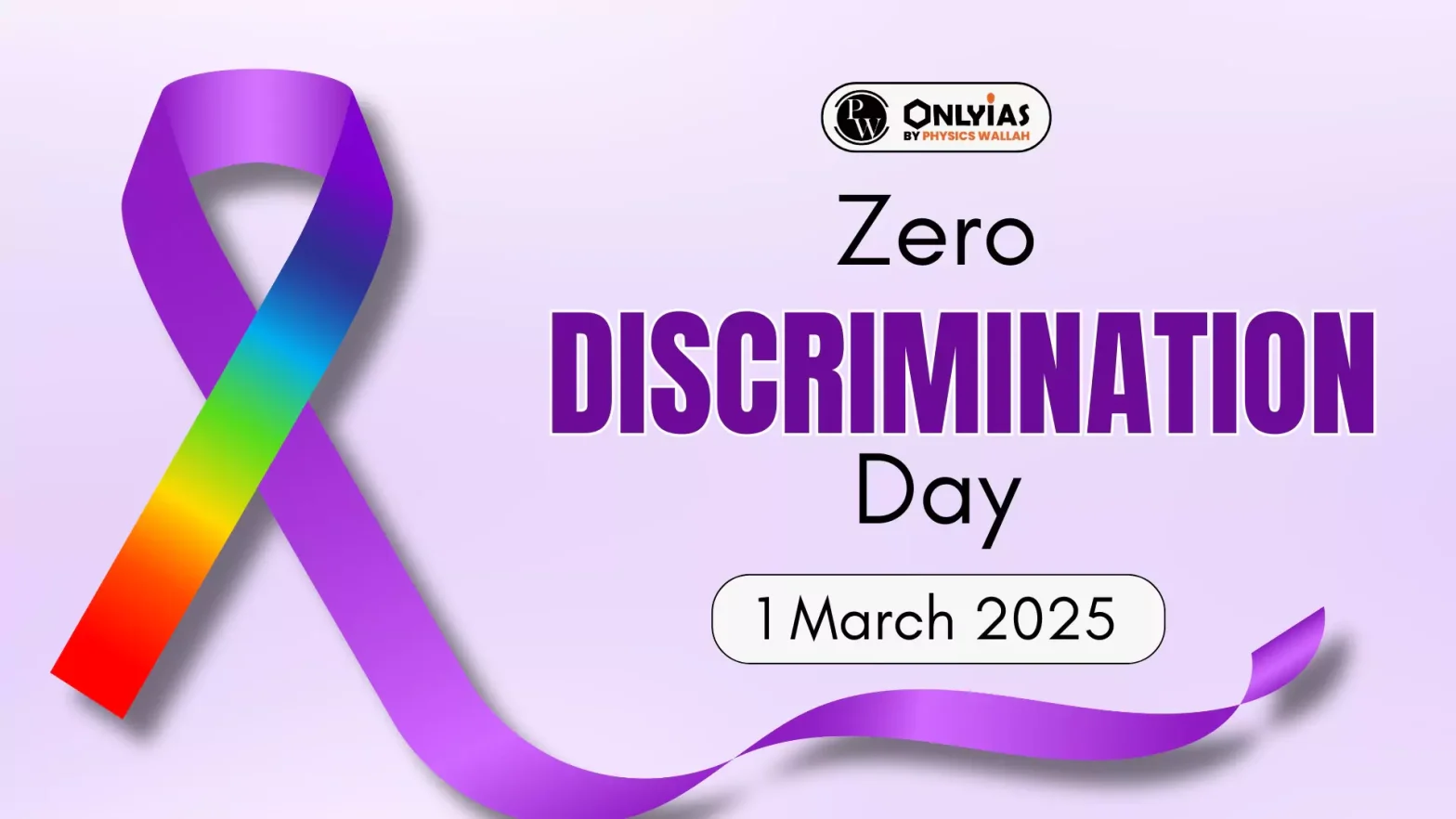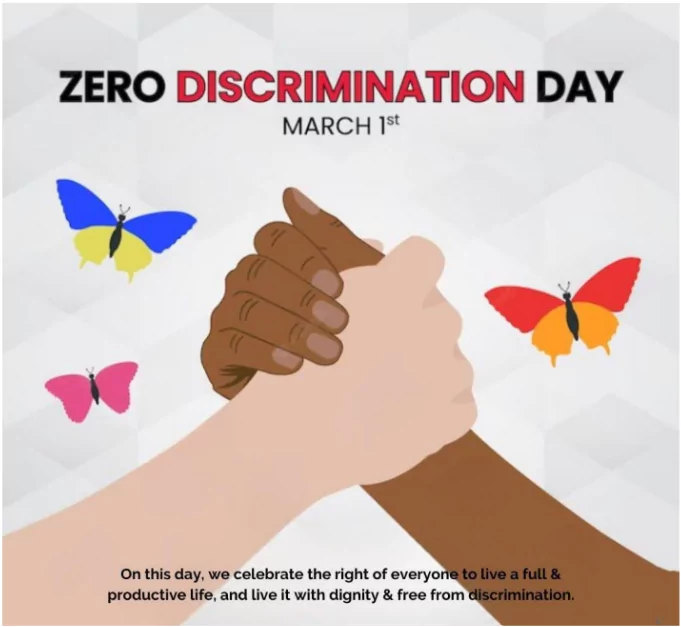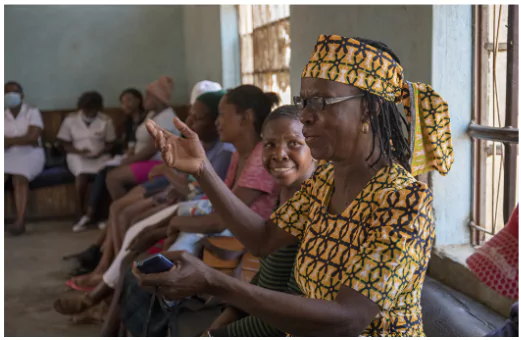Zero Discrimination Day 2025 highlights the need for an inclusive society. Commemorate Zero Discrimination Day 2025 by supporting equal rights, dignity, and justice for all individuals worldwide.

Zero Discrimination Day is observed annually on March 1st to promote equality and the right of every individual to live a dignified and fulfilling life without facing discrimination. Observed and led by UNAIDS, this global initiative raises awareness about discriminatory practices based on race, gender, sexual orientation, disability, and socioeconomic status. Zero Discrimination Day 2025 acts as a reminder that diversity should be embraced, and societies must work towards eliminating stigma, prejudice, and injustice.

Zero Discrimination Day is an initiative led by UNAIDS (Joint United Nations Programme on HIV/AIDS) to raise awareness about discrimination and its negative impact on people’s lives. It was first observed on 1st March 2014, following the launch of the UNAIDS Zero Discrimination campaign.
Discrimination is a widespread issue based on gender, race, sexual orientation, HIV status, disability, and other factors, affecting people’s access to healthcare, education, employment, and social services. Zero Discrimination Day acts as a platform to call for policies that ensure fairness, dignity, and respect for all individuals, regardless of their backgrounds.
| Zero Discrimination Day 2025 Overview | |
| Aspect | Details |
| Event Name | Zero Discrimination Day 2025 |
| Date | March 1, 2025 |
| First Observed | 2014 |
| Organized By | UNAIDS (Joint United Nations Programme on HIV/AIDS) |
| Theme for 2025 | “We Stand Together” |
| Purpose | Promote equality, eliminate discrimination, and support marginalized communities |
| Key Focus Areas |
|
| Significance | Raises awareness about discrimination based on race, gender, disability, HIV status, and other factors |
| How to Participate |
|
Zero Discrimination Day is observed on 1st March every year. The date was chosen by UNAIDS to promote solidarity and encourage action against discrimination worldwide. On Zero Discrimination Day 2025 various organizations, governments, and civil society groups organize campaigns and discussions to highlight the importance of equal rights and opportunities for all.
Zero Discrimination Day is observed to:
Each year, Zero Discrimination Day has a theme that highlights a particular aspect of discrimination. The Zero Discrimination Day Theme 2025 is “We Stand Together.”

This theme underscores the importance of unity and collective action in fighting discrimination. UNAIDS, which plays a key role in organizing this global event, emphasizes that communities are at the core of sustainable health and social justice efforts.
For over 40 years, communities have been at the forefront of tackling discrimination, particularly in the fight against HIV/AIDS. However, these communities continue to face:
Despite these challenges, community organizations play a crucial role in ensuring that health services reach marginalized populations, supporting human rights, and monitoring policies that affect vulnerable groups.
The observance of Zero Discrimination Day 2025 highlights several pressing issues that need urgent attention. Discrimination is exemplified in different ways, affecting people’s rights, opportunities, and access to essential services. Below are some key areas where action is needed:
The HIV/AIDS epidemic continues to affect millions globally. Despite medical advancements, people living with HIV often face legal and social barriers that prevent them from receiving adequate care. The UNAIDS campaign urges countries to:
Gender-based discrimination is still prevalent across the world. According to UN Women (2024):
Zero Discrimination Day 2025 calls for stronger laws, education, and social awareness to promote gender equality and women’s empowerment.
Workplace discrimination remains a significant issue. According to the EEOC (Equal Employment Opportunity Commission) 2024 report:
To combat this, organizations must implement fair hiring policies, diversity training, and workplace inclusion programs.
Millions of people still lack basic education and healthcare services due to discrimination based on economic status, disability, and ethnicity. The United Nations Sustainable Development Goals (SDGs) emphasize universal access to education and medical care as a means to reduce inequalities.
Many countries still enforce laws that discriminate against marginalized groups. UNAIDS and human rights organizations urge governments to repeal discriminatory laws and enact policies that protect vulnerable populations.
Even though progress has been made, discrimination remains a significant issue globally. Some of the major challenges include:
To achieve a discrimination-free world, governments, organizations, and individuals must take the following steps:
Zero Discrimination Day 2025 is an opportunity to reaffirm our commitment to a fair and just society. Discrimination remains a significant challenge worldwide, but by working together under the theme “We Stand Together,” individuals, communities, and governments can take meaningful steps toward eliminating all forms of discrimination. By standing together, we can create a world where everyone has the opportunity to live with dignity and respect.
Zero Discrimination Day is observed globally to promote equality and inclusion, ensuring every individual is treated with dignity, regardless of differences.
Zero Discrimination Day is observed on 1st March every year to highlight the need for eliminating discrimination in all forms.
It is observed to raise awareness about discrimination based on gender, race, health status, and more, and to advocate for an inclusive society.
The Zero Discrimination Day theme 2025 is "We stand together", emphasizing support for marginalized communities and sustainable global health efforts.
It is marked by awareness campaigns, discussions, and initiatives led by global organizations to promote equality and fight against discrimination.
UNAIDS initiated Zero Discrimination Day in 2014, aiming to combat stigma, particularly concerning HIV/AIDS, and to foster an inclusive world.
<div class="new-fform">
</div>